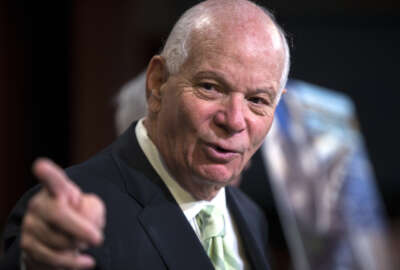To listen to the Federal Newscast on your phone or mobile device, subscribe on PodcastOne or iTunes.
- At $400,000 per year, President Donald Trump doesn’t even come close to matching the annual income of the highest paid employee in federal government. That honor goes to the president and CEO of the Tennessee Valley Authority, Bill Johnson, whose salary was $4.9 million this year. Johnson had a $995,000 base salary, but after a year of company cost savings, safety records, lower electric rates and low carbon emissions, bonuses put Johnson’s overall compensation package at nearly $5 million. Last week, the TVA board of directors gave Johnson a 5.5 percent pay raise that, with bonuses, could give him $6.5 million annually. TVA said Johnson’s pay is comparatively low, given the salaries of other utility companies that are not in public service. (Knox News)
- The Senate Appropriations Subcommittee on Financial Services and General Government has remained silent on a pay raise for federal employees. The House has also been quiet on the topic. That sets the stage for the president’s request of a 1.9 percent pay raise for federal employees next year. The Senate Subcommittee also released the final mark of the 2018 appropriations bill. Its highlights included no funding for federal construction projects, and cuts to the IRS budget to$124 million below last year’s levels. (Senate Appropriations)
- The White House has asked Congress to cancel some programs already funded in order to make available $11 billion to offset the costs of emergency disaster relief. The bulk of the reductions would come from the Energy Department’s Advanced Technology Vehicle Loan Program and the Education Department’s future spending on Pell grants. The money would be switched to the Federal Emergency Relief Agency and the Small Business Administation’s relief efforts. Congress has already been asked for an additional $44 billion to fund relief efforts in the aftermath of Hurricanes Harvey, Irma and Maria, as well as the devastating wildfires in California. (Federal News Radio)
- The Homeland Security inspector general (IG) said the Federal Emergency Management Agency (FEMA) obligated $310 millions for facilities damaged by Hurricanes Harvey and Irma. Those storms overlapped areas affected by earlier storms such as Hurricane Matthew. FEMA’s IG said some of the Harvey and Irma money may have been granted to facilities before repairs were made from the earlier incidents. The IG urged FEMA auditors to tighten controls for avoiding duplicate payments. (DHS OIG)
- The Defense Department’s (DoD) inspector general said the military’s TRICARE health care program has been too slow to respond to the rapidly rising cost of drugs, puting the Defense health agency at risk for fraudulent claims. In its report issued Monday, the DoD IG also targeted the need to focus attention and resources on behavioral health issues. Specifically cited were the detection and treatment for mental disorders related to long deployments and combat stress. (Defense.gov)
- The Veterans Affairs Department (VA) has launched on online appointment scheduling system to help veterans access their own primary or specialty care appointments in a more convenient way. Veterans will need a Premium My HealtheVet Account to use online scheduling. Currently, online scheduling is available at more than 100 VA facilities and their associated Community Based Outpatient Clinics. VA said it was working to make online scheduling available at nearly all VA facilities next year. (Veterans Affairs)
- Sen. Claire McCaskill (D-Mo.) has called on two federal agencies to review identical programs. McCaskill requested information from the Commerce Department and the Small Business Administration about their entrepreneurial assistance programs. McCaskill wanted to know how their programs differ from other agencies and whether they’ve been analyzed for duplicative frameworks. Government auditors warned there are dozens of these programs governmentwide that could be very similar and also lack oversight. (Federal News Radio)
Copyright
© 2024 Federal News Network. All rights reserved. This website is not intended for users located within the European Economic Area.
